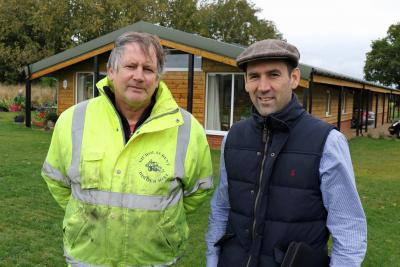SHEDS TODAY, HOUSES TOMORROW: FREE EVENT FOR FARMERS LOOKING TO CONVERT BUILDINGS FOR RESIDENTIAL USE

Farmers who are looking to revitalise redundant agricultural buildings and reinvent them as residential dwellings are being offered the opportunity to hear from specialists in town planning, commercial surveying, taxation and financial planning at a free seminar next month entitled ‘Sheds Today, Houses Tomorrow’.
Hosted jointly by Durrants, Lovewell Blake and Barclays, the free event at the Cedars Hotel in Stowmarket on Tuesday 27th June will see experts outline all aspects of building conversion, from securing planning approval, valuation and developing a sales strategy, to lending considerations and navigating tax requirements.
Speakers include:
- Hamish Lampp from Durrants, who will outline the planning approvals process governing the conversion of farm buildings to residential use
- Richard Prentice from Durrants, who will provide an overview of practical issues which may arise as a result of the scheme, together with valuation and marketing
- Andrew Miller and Liz Hill from Lovewell Blake, who will consider the likely tax and VAT consequences arising from the retention of converted buildings, or from any subsequent sale
- Mark Hawes from Barclays, who will run through short- and long-term lending considerations for these types of projects
Lovewell Blake agricultural partner Brian Bale commented, “Permitted Development Rights have dramatically changed the planning landscape for farmers seeking to convert derelict and redundant agricultural buildings for residential use.
“Historically, the planning bar for conversion was set very high, with conversions having to pass numerous policy tests before permission would be granted. Now the permitted development regime means that any farm building, old or modern, that can be physically converted, is allowed to be converted, subject to certain set criteria.”
Hamish Lampp from Durrants added, “It’s a real win:win for rural communities: the process is much simpler than it was, and it means that more residential dwellings will be built for local people to live in – and the developments will also provide much-needed additional income for hard-pressed farming businesses.”
‘Sheds Today, Houses Tomorrow’, hosted jointly by Durrants, Lovewell Blake and Barclays, takes place at the cedars Hotel in Stowmarket on Tuesday 27th June at 7.15pm. The event is free, but places must be reserved in advance by contacting Maria Cumbers at maria.cumbers@durrants.com or on 01379 646602.
Case Study
A disused pig shed has been transformed into two residential dwellings at a south Norfolk farm.
Farmer Nick Dent first had the idea of converting the run-down building four years ago, but had no luck achieving planning consent for the project. However, when Permitted Development Rights were introduced in 2014 allowing redundant agricultural buildings to be converted into residential use, he was able to get the go-ahead with little hassle.
Unlike many farmers who gain permission and immediately sell the land to a developer, Nick decided to project manage the conversion himself. Less than two years later the result is two single-storey homes, a three-bedroom dwelling which was snapped up even before it was finished, and a four-bedroom home which has also now sold.
“I didn’t want the hassle of tenants, so it seemed sensible to build homes to sell, so that I could realise the value of the land,” says Nick. “Local people were supportive of what I was trying to do, with one neighbour even writing to the council recommending that they approved the scheme.”
While Nick is keen to encourage other farmers to take advantage of Permitted Development Rights, he is more cautious about recommending the DIY project management route.
“I have had a huge amount of sleepless nights and a lot of stress. Perhaps inevitably things have taken longer and cost more than I originally envisaged. I would do it again, but I have learnt some important lessons, the main one being that a conversion is much more complex and challenging than a new build from scratch.
“Permitted Development Rights have opened up a real opportunity for farmers to convert redundant buildings and realise value; my advice is to consider just how onerous project managing a conversion like this can be before you commit to doing it yourself.”













































